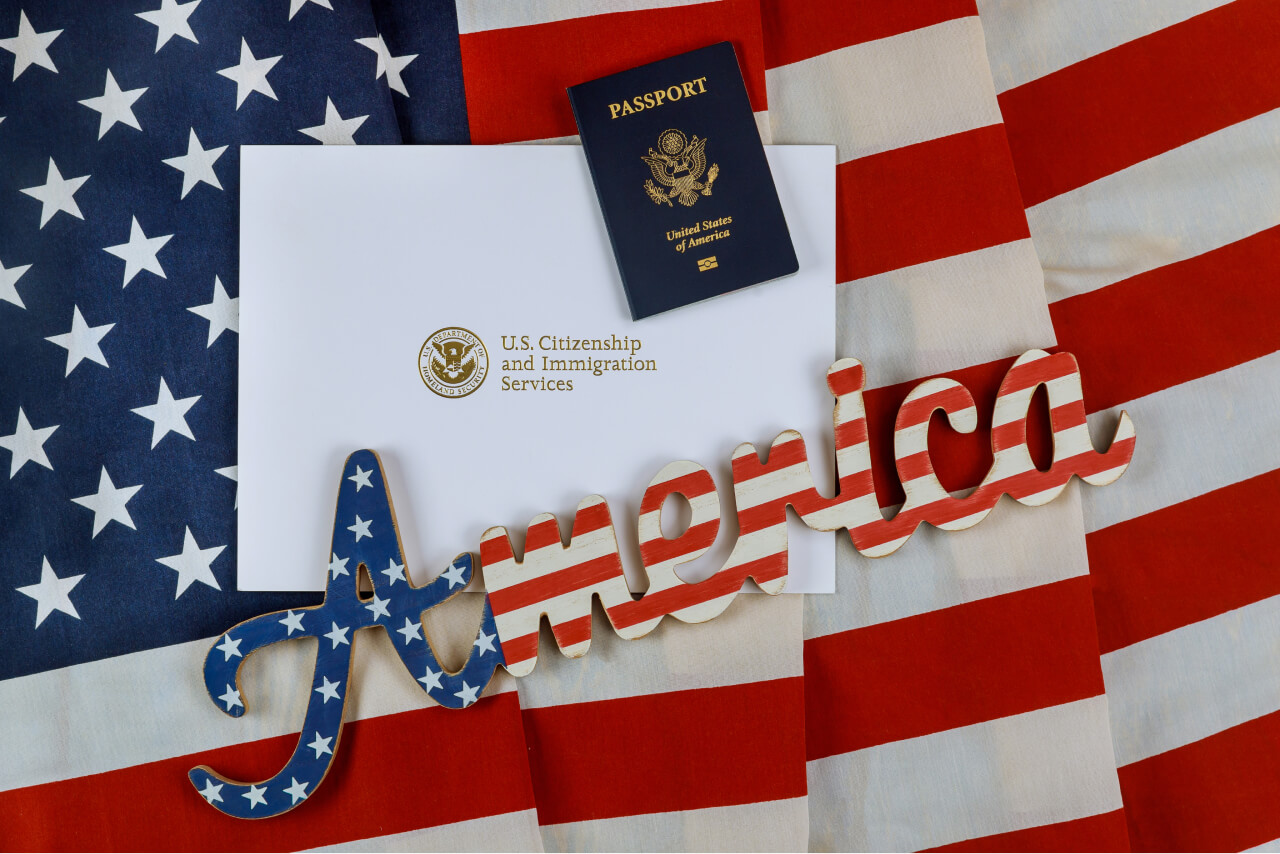The process of Naturalization basically requires, meeting one of the various requirements for obtaining Citizenship, and then filing an application for Citizenship with the USCIS. In most cases, an applicant will have to be a Permanent Resident and meet certain residency requirements before naturalizing, but not always.
In this article we will explain the most common forms of eligibility for Naturalization, before going into the specific process:
If you are a Permanent Resident and the basis of your Permanent Residency is marriage to a U.S. Citizen; then you are likely eligible for Naturalization, if:
- You are 18 or older
- You have been a Permanent Resident (Green Card holder) for at least 3 years immediately before you file, Form N-400, Application for Naturalization.
- You have been living as a married couple with your U.S. citizen spouse, who has been a U.S. citizen the entire time, during the 3 years immediately before you file the N-400 application–and up until examination on the application
- You need to have lived within the state, or USCIS district with jurisdiction over your place of residence, for at least 3 months prior to the date of filing the application
- You must have continuous residence in the United States as a permanent resident for at least 3 years immediately before filing your application
- You must be willing and able to reside continuously within the United States from the date of your Application for Naturalization, until the time of Naturalization
- You must have been physically present in the United States, for at least 18 months out of the 3 years immediately before filing the application
- You must be able to read, write, and speak English, and have a knowledge of U.S. history and government (civics)
- You must be a person of good moral character, have followed and be willing to continue to follow the Constitution of the United States, and be suited to, and desire the good order and happiness of the United States

If you are a Permanent Resident and the basis of your Permanent Residency is not marriage; but rather employment or through other non-spousal family relations, then you are likely eligible for Naturalization, if:
- You meet the non-timeline requirements described above: (lived in the same jurisdiction where you will file the N-400 for 3 months before applying, you are 18 or older, a person of good moral character, able to read and write English, etc…)
- And if you meet the following slightly longer, timeline requirements:
- You have been a green card holder for at least 5 years (as opposed to 3 with marriage), before the date of filing your Form N-400, Application for Naturalization.
- You have had continuous residence in the U.S. as a Green Card holder for at least 5 years (again as opposed to 3 with marriage), immediately before filing your N-400
You must have been physically present in the United States for at least 30 months out of the 5 years immediately before applying
If you meet the eligibility requirements just described, congratulations! You are most likely eligible for Citizenship. There are certain things (such as certain crimes) that could make you ineligible ultimately, but these are the basic requirements in the most common cases. If you do not meet these basic requirements described above, but you are the Spouse or a Child of a U.S. Serviceman (those serving in the U.S. Armed forces):
You are often eligible for quicker naturalization processes, even though you might not meet all of the traditionally basic requirements. For more information on this, please go to the relevant USCIS page on these options, available here.
Now, there may be other more obscure ways that you or your children could meet the eligibility requirements for Naturalization, but this article is only intended to outline the most common eligibility pathways and the basics of the Naturalization process. If you have an adopted child, or if your child is a permanent resident and you are already a U.S. Citizen, you may want to look into the eligibility pathways/requirements on this page.

Now, let’s get into the specifics of the Naturalization process:
- Assuming you are eligible to Naturalize, the first step is going to be filing an N-400 Application for Naturalization. This is the application, and it will ask you certain questions to assess your eligibility for Naturalization. You will need to fill out the required fields and submit the application fee of $640 dollars unless you qualify for a fee waiver or a reduced fee, and typically an $85 dollar “Biometrics” fee.
- After filing your application, USCIS will perform a background check. The background and security checks will involve taking your fingerprints, and also running various criminal record checks with the FBI and other agencies. To obtain your fingerprints, they will give you notice upon receiving your Naturalization application, that instructs you to go to an appointment at an “Application Support Center,” for collection of your fingerprints, and other biometrics (such as photographs and your signature).
- The next step will be a Naturalization Examination (with a Naturalization Interview). USCIS has the authority to conduct a Naturalization interview in which they will ask you questions generally about your eligibility, and questions related to your specific application for Naturalization. The USCIS officer who conducts the interview will have the authority to place you under oath, obtain oral and written evidence from you, subpoena witnesses and request additional evidence, and sometimes administer the oath of allegiance. You will have the option to bring an attorney with you to this interview if you so desire. Also as part of your interview day, you will be tested on your knowledge of English and of United States history, the Constitution, and the U.S. government, generally. The Interviewing officer will use your pre-interview applicant file (which will have your FBI background check in it along with other information), your interview answers, and the results of the educational exam, to ultimately determine if you’re eligible or not for Naturalization. They will give you notice on that same day, and you may ultimately find out that you are going to be a Citizen on that same day. Also possible, if there are certain deficiencies with your Naturalization eligibility, you will be informed what those are, and you may have a “Subsequent Re-examination” scheduled to give you an opportunity to overcome those deficiencies (say you fail the U.S. educational exam, for example). At the “Subsequent Re-examination,” if you are not able to overcome the problems with your application, then it will be denied and you’ll have the opportunity to appeal.
- If all goes well with your Naturalization Examination or with your Re-examination, then you should receive a favorable decision (despite the fact that the Officer will have given you notice at the end of your interview day), within 120 days after your interview. Once your application has been approved, then USCIS has some internal procedures they will subject your application to, including a “Re-verification Procedure;” where they will make sure approving your application was the right decision. This is a system of checks and balances within the USCIS, and it will be done by a different USCIS officer. Assuming everything is fine with your application pursuant to the “Re-verification Procedure,” USCIS will schedule you for a ceremony in which you will take the Oath of Allegiance.
- You will take the Oath of Allegiance at a scheduled ceremony and congratulations, you will then be a Citizen of the wonderful, and beautiful, United States of America.
So there you have it, the basics behind the Naturalization process to becoming a United States Citizen. We have outlined the process with steps that we hope are easy to understand, but please understand that it is a complicated legal process and procedure. The help of an experienced Immigration Attorney can greatly aid you in your journey of becoming a U.S. Citizen, and you should not hesitate to contact one should you have any doubts or questions during the process.
